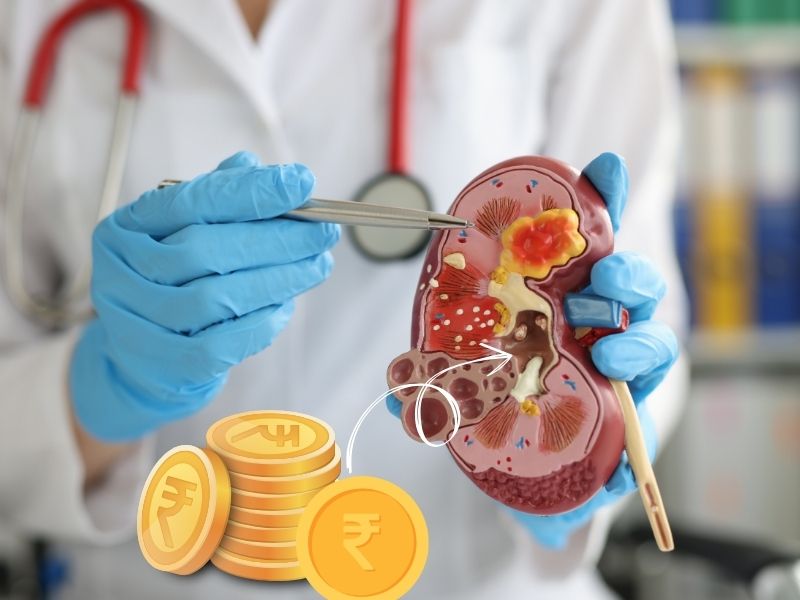Kidney stones are crystalized mineral deposits that form in the kidneys. These deposits are often small and are flushed out of the body via the urethra. But often, these small crystals combine together to form stones. These stones require prompt treatment to remove them from the body and lead a healthy life.
With advancements in medical technology, new treatment options have been introduced to treat kidney stones effectively and less invasively. In this blog, we will discuss the potential causes of kidney stones, modern treatment options for them, and how much they could cost you.
1. Understanding Kidney Stones: Causes and Symptoms
Kidney stones are formed in the kidney when the urine contains high levels of minerals and salts due to their increased levels in the blood. These minerals crystallize and harden due to continuous deposits over time. This can be because of many reasons:
Causes:
Dehydration: Not drinking enough water can lead to a concentration of minerals and salts in urine, hence promoting stone formation.
Diet: A diet with high amounts of salt, oxalate, and proteins can increase the risk of stone formation in the kidneys.
Genetics: Genetics also plays a vital role in kidney stone formation. If anyone in your family had kidney stones, you are likely to develop them as well.
Medical conditions: Many medical conditions like hyperparathyroidism, urinary tract infections, and digestive diseases can increase minerals in the blood and raise the risk of stones.
Symptoms:
Continuous pain in the lower back or sides of the stomach.
Pain during urination or a sudden, urgent need to urinate.
Blood in the urine.
Cloudy or foul-smelling urine.
2. Non-Surgical Treatments for Kidney Stones
Kidney stones can often be managed without surgery, especially if the stones are small.
Medications: Kidney stones can be managed with medications such as alpha-blockers, pain-relievers, and other oral medications that help relax ureter muscles so that stones pass easily or dissolve.
Water Intake: Drink enough water every day to help flush out the toxins in your body and also help dissolve the stones. Drinking at least 8-10 glasses of water daily is recommended.
Dietary Modification: Modify your diet to reduce oxalates, salt, and animal protein so that there is less stress on the kidneys.
3. Advanced Minimally Invasive Treatments
Shock Wave Lithotripsy (SWL): Sound Waves in Shock Wave Therapy can be used to break the stones in the kidney into smaller pieces so they can pass easily.
Ureteroscopy: Ureteroscopy uses a small camera to locate the stones in the kidney and remove them.
Percutaneous Nephrolithotomy (PCNL): PCNL is used for larger kidney stones. A small incision is made to remove the stones directly and relieve the pain.
These are modern treatments to remove the stones efficiently as compared to traditional open surgery, which is much more invasive and takes longer to heal.
4. Laser Treatments for Kidney Stones
Laser treatments are another revolutionary treatment for kidney stones, which uses laser light to break kidney stones into fine pieces for easier removal from the body that are difficult to remove otherwise. Laser treatments are highly effective for hard-to-treat stones or crystals in challenging locations; typically performed through ureteroscopy, a minimally invasive procedure, laser treatments offer a faster recovery time, fewer side effects, and reduce the need for repeated interventions.
5. Factors That Influence Kidney Stone Treatment Costs
Size and location of the stone: Larger stones or stones in hard-to-reach areas require more advanced and complicated treatments that may be comparatively expensive.
Type of treatment: Types of treatments also play a vital role in determining the cost of the treatments. Medicinal treatments are often less expensive than surgery.
Geographical location: Treatment costs differ according to the geographical locations and urbanization of the clinic.
7. How to Choose the Right Treatment for You
Stone size and location: If the stone size is small, it can be passed on with medications, whereas the larger stones may require advanced procedures.
Medical history: Your medical history is also important in determining the right treatment for you.
Cost and convenience: Choosing the right treatment depends on your financial budget, the recovery time required, and effectiveness. These factors must be considered before making a decision.
Consult with a specialist: Before deciding on a procedure, consult a urology expert to determine the best treatment based on your health, stone size, and preferences. Book an appointment with Shree Shrinivasa Urocare, the best urology hospital in Bangalore.

